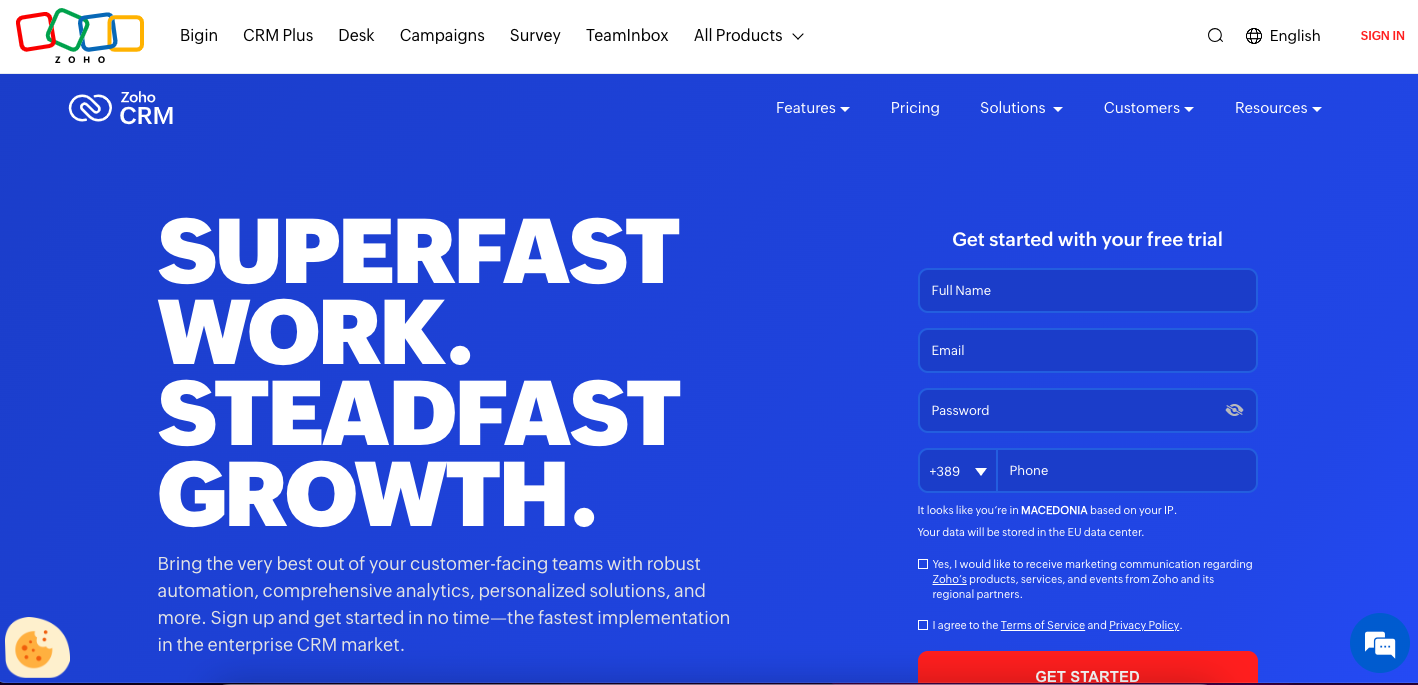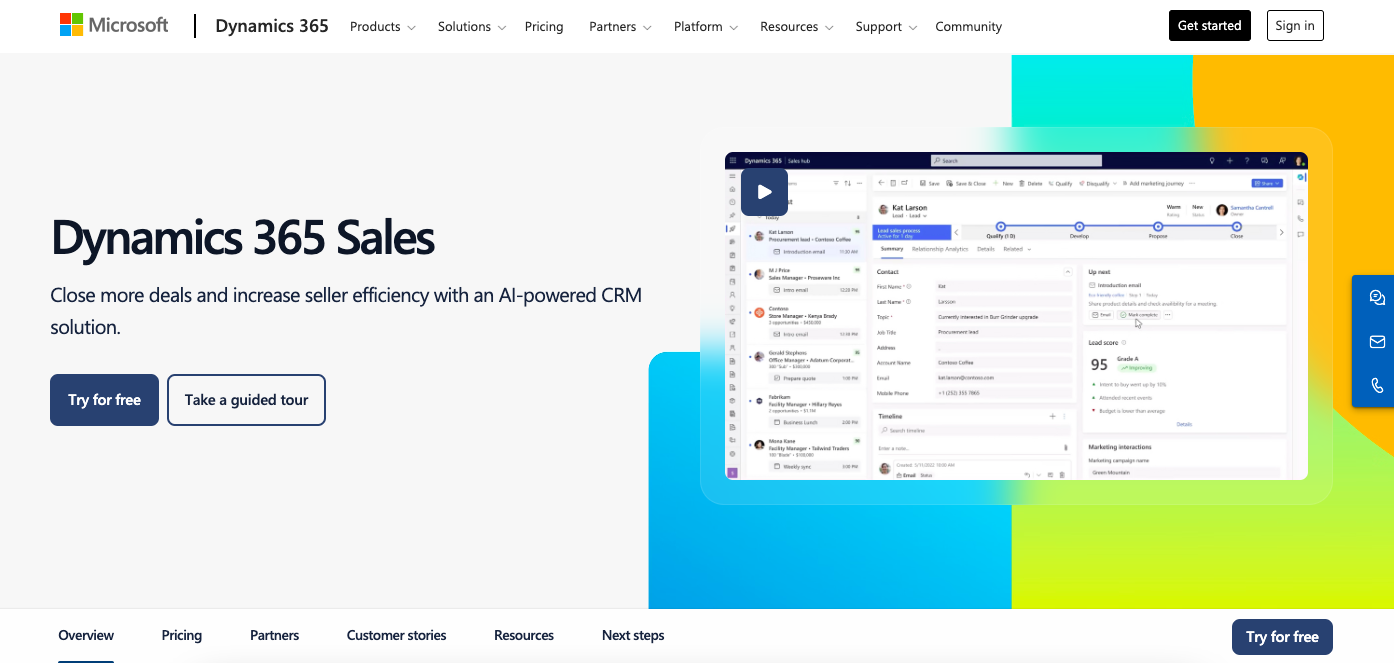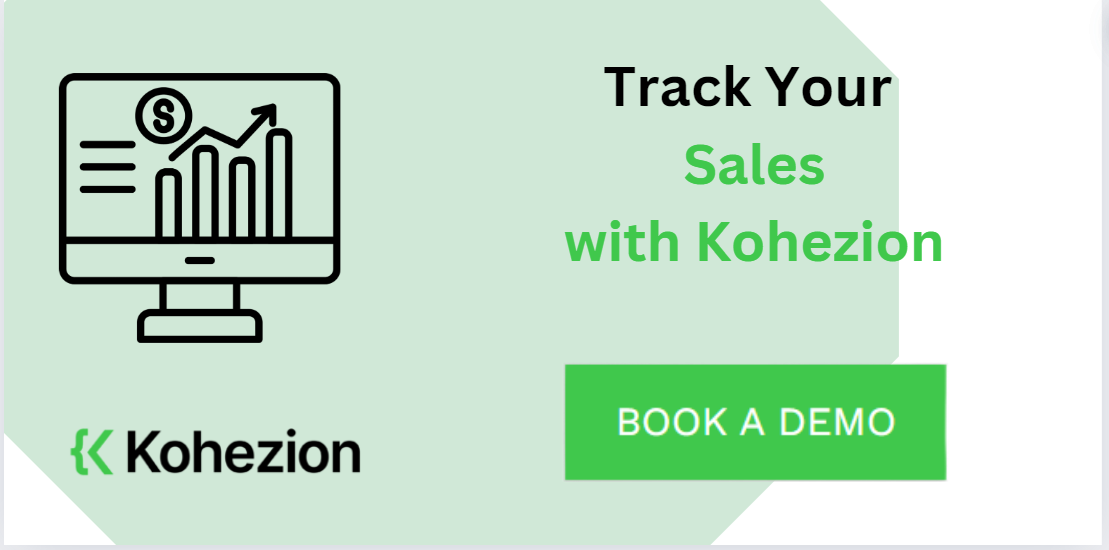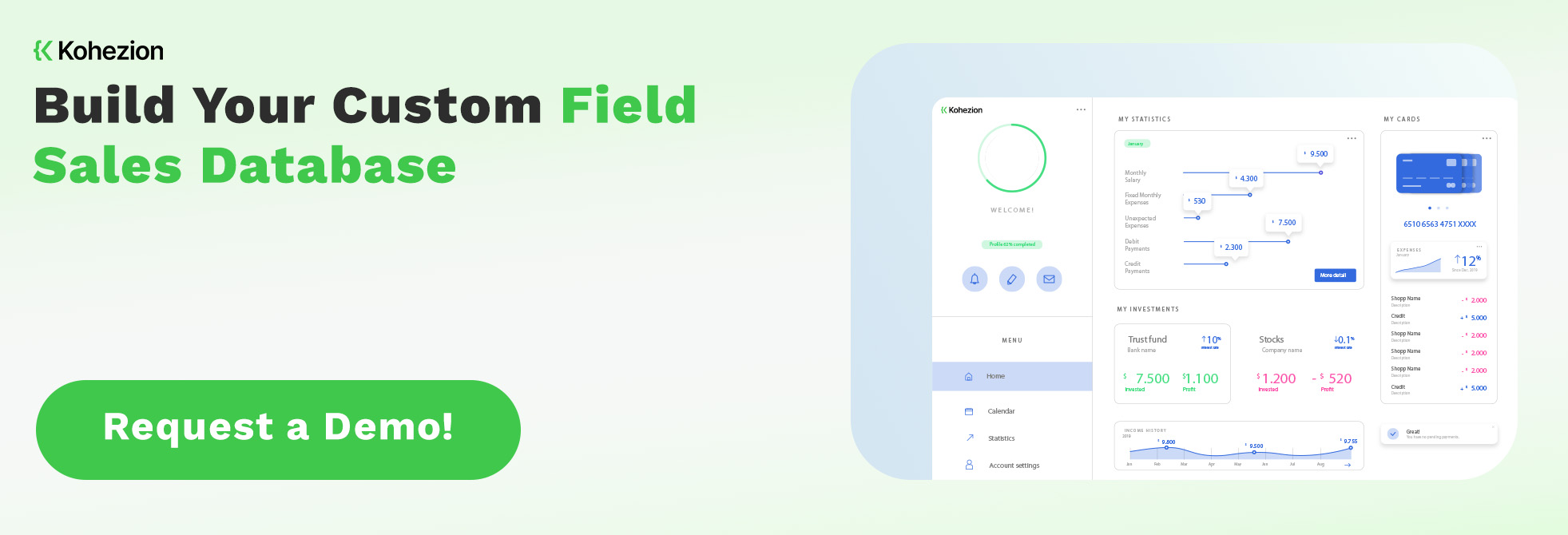Managing sales effectively is crucial for any business aiming for growth and success. Research shows that 43% of salespeople use intelligence tools for sales tracking, which is a 54% increase from two years earlier.
This article will explore how sales tracker software solutions can streamline your sales processes, improve efficiency, and help your sales team achieve better results.
What Is a Sales Tracker?
A sales activity tracker provides real-time insights into every facet of your pipeline. It is a sophisticated dashboard that aggregates all your sales activities, from tracking customer interactions to managing deals and monitoring quotas.
With a sales tracker, visibility into the nuanced dance of closing deals becomes clearer. It encompasses everything from inquiries, sales conversations, and meetings to operational tasks like document collection.
Why Is Tracking Sales Important?
Tracking sales provides a granular view into the effectiveness of your sales activities, pinpointing where you're doing well and where there's room for improvement. It helps transform data into actionable insights, allowing your team to make informed decisions. Sales tracking ensures that no lead is left unattended and every opportunity is seized to achieve your sales targets.
Benefits of a Sales Tracker
Using a sales tracker can significantly improve your sales process. Here are some key benefits that show how it can improve your sales management.
Increased Sales Process Efficiency
A robust sales tracker automates mundane tasks and provides quick access to important customer data. This streamlines your sales process and lets you focus on what truly matters — selling. It also improves lead qualification and follow-up timelines, reducing the risk of prospects going cold.
Simplified Pipeline Management
A competent sales tracker provides a way to declutter and organize your sales pipeline for maximum clarity and impact. This is achieved with features like drag-and-drop interfaces to progress deals through stages, customizable pipeline views to match your unique sales process, and bulk actions to update multiple deals simultaneously.
A simplified pipeline makes your sales process more understandable and more manageable, leading to a more agile and successful sales operation.
Strengthened Customer Relationship Management
Leveraging a sales tracker with a robust CRM component enables your sales reps to personalize their interactions based on reliable, up-to-date customer information.
This combination provides a 360-degree view of customer interactions, allowing for more personalized and timely engagements. It can forecast customer needs and proactively offer solutions, improving customer satisfaction. A sales tracker with CRM also enables seamless tracking of customer preferences, history, and feedback to tailor your services and foster loyalty.
Sales tracker with CRM functionalities empowers your team to build lasting relationships that convert one-time buyers into lifelong customers.
Precise Sales Forecasting
A sales tracker analyzes historical data and current trends to produce reliable forecasts. This enables you to predict future revenue with greater accuracy. Precision in forecasting allows you to set realistic sales goals and gives you insights for better inventory and resource planning. It also helps you understand market trends, allowing for strategic adjustments and timely responses to emerging opportunities.
Instant Data and Reporting
A high-quality sales tracker provides immediate insights through interactive dashboards and comprehensive reports. This lets you recognize patterns, seize opportunities, and spot weaknesses instantly.
You can customize reports to reflect the metrics you care about most, improving relevance and focus. Downloadable reports are available at the click of a button, allowing for data analysis and sharing, even offline.
Improved Sales Team Productivity
A sales tracker revolutionizes your team's output, facilitating a high-performance culture. Sales reps save time with streamlined administrative tasks, allowing them to focus more on selling. Gamification and instant visibility into performance metrics spur healthy competition and a drive to excel. Access to actionable data enables reps to prioritize their activities for the highest impact.
Efficient Lead Management
With a cutting-edge sales tracker, leads no longer fall through the cracks. Instead, they're nurtured systematically until ready for conversion. Automatic lead capture and distribution ensure that every prospect is promptly and properly routed to the right sales rep. Lead scoring helps prioritize engagements, allowing the team to focus their efforts where it matters most.
Industry-specific Focus
Every industry has its quirks and demands, and a one-size-fits-all approach can sometimes miss the mark. Sales trackers provide customizable templates and tools designed to address your industry's particular sales processes. They also offer detailed analytics that highlights trends and opportunities relevant to your niche.
Improved Collaboration
Sales trackers help build greater synchronization among team members. They make it effortless to share information and updates instantly, ensuring everyone is on the same page. They also help you hold productive sales meetings and product demos with integrated tools such as Zoom, Google Calendar, and WhatsApp.
Informed Strategy Formulation
Informed strategy formulation is the culmination of all data, insights, and metrics provided by a sales tracker. With comprehensive information, strategic planning is based on decisions backed by data. You can quickly assess and adapt sales strategies to changing market conditions or new insights, maintaining a competitive edge.
![]()
11 Best Sales Tracker Software
Choosing the right sales tracker software can make a big difference in managing your sales effectively. Here are 11 of the best options available.
1. Kohezion

Kohezion is an online database software that also functions as an effective sales tracker. It empowers businesses to manage their sales activities effortlessly and is renowned for its customizability and user-friendly interface.
Kohezion offers a highly customizable platform that is accessible and adaptable to different industries. Its no-code approach lets you tailor the software to specific sales tracking requirements without extensive IT knowledge.
Top 5 Features:
- Intuitive drag-and-drop application builder.
- Sophisticated data filtering and reporting capabilities.
- Role-based access control for data security.
- Extensive custom form and field creation options.
- Robust task management with automated workflows.
Five Benefits:
- Accelerated sales reporting and analysis.
- Improved productivity through workflow automation.
- Improved data accuracy with customizable forms.
- Strengthened data security through controlled access.
- Seamless integration with existing business processes and tools.
Two Cons:
- Might be overwhelming for first-time users due to extensive customization options.
- Businesses with highly complex sales processes may require additional customization, which can be time-consuming.
Best For: Small to medium-sized businesses seeking an affordable and scalable sales tracking solution that can grow with their evolving needs.
2. HubSpot Sales Hub

HubSpot Sales Hub is known for its integrative approach and full-stack capabilities. It is a complete sales suite that promotes collaboration and automates time-consuming tasks. The platform's seamless integration with the HubSpot CRM ensures a seamless flow of information and improves prospect management.
Top 5 Features:
- Detailed contact and deal records for personalized sales approaches.
- Automated email tracking and notifications to keep tabs on prospect engagement.
- Customizable sales pipeline management tools that reflect unique sales processes.
- Robust reporting dashboards that visualize sales performance.
- A suite of productivity tools, including meeting schedulers and live chat.
Five Benefits:
- A holistic view of the sales pipeline provides clarity on progress and challenges.
- Task automation frees up time for more meaningful customer interactions.
- Email integration ensures communications are tracked without additional effort.
- Interactive dashboards offer valuable insights for strategic decision-making.
- The HubSpot ecosystem supports marketing, sales, and service alignment.
Two Cons:
- Some advanced features come with a premium price tag.
- The sheer breadth of tools available can sometimes feel overwhelming for smaller teams or those new to sales trackers.
Best For: Sales teams that need an all-in-one solution to drive collaborative sales strategies and automate sales processes.
3. Salesforce Sales Cloud

Salesforce Sales Cloud is known for its exhaustive set of features and customization capabilities. Its deep analytics and comprehensive tracking tools provide exceptional oversight of sales metrics. The tool offers tailored solutions and advanced reporting capabilities that cater to businesses with intricate sales cycles and large client bases.
Top 5 Features:
- Comprehensive pipeline and forecast management.
- Detailed customer journey mapping and lead tracking.
- Sophisticated workflow automation to streamline sales tasks.
- Real-time analytics and in-depth business performance reports.
- Extensive customization options to tailor the platform to precise business needs.
Five Benefits:
- Real-time visibility into sales activities helps in making informed decisions quickly.
- Advanced forecasting abilities allow for accurate sales planning and resource allocation.
- Streamlined operations reduce the administrative burden on sales reps.
- Tailored dashboards enable focusing on key indicators for efficiency.
- Scalability benefits large organizations or those expecting growth.
Two Cons:
- High price points can be a barrier for smaller businesses.
- Complexity and breadth of capabilities require a learning curve and possibly external consultancy for optimal use.
Best For: Larger enterprises or businesses that require a high degree of customization and have the resources to fully leverage its extensive features.
4. Pipedrive

Pipedrive stands out for its intuitive interface and clear visualization of sales pipeline stages. Its primary design is to assist salespeople in maintaining focus on impactful activities with features such as AI-powered sales tips.
Top 5 Features:
- Customizable pipelines that adapt to your business's unique sales process.
- Sales automation tools to minimize repetitive tasks and streamline activities.
- Advanced lead and deal tracking to maintain a pulse on your sales velocity.
- A suite of reporting tools that furnish detailed insights for improved performance.
- Sales forecasting features that support informed planning and strategy.
Five Benefits:
- Accelerates the deal-moving process with easily understandable pipeline stages.
- Empowers sales teams with automation, reducing time spent on admin.
- Delivers personalized tips via an AI-powered sales assistant.
- Simplifies task and goal setting to keep teams aligned and focused.
- Improves lead management with tools to identify and prioritize hot leads.
Two Cons:
- Some integrations may require additional costs, limiting access to full functionality within a tight budget.
- Customization capabilities, while powerful, may not be as extensive as other enterprise-level CRMs.
Best For: Sales teams that prefer a straightforward, visually driven sales tracking system. It is particularly useful to small to medium-sized businesses looking for cost-effective sophistication.
5. Zoho CRM

Zoho CRM has a rich feature set of tools for sales tracking, including contact management and detailed analytics. With workflow automation and gamification options, Zoho CRM improves efficiency and team motivation.
Top 5 Features:
- Automated workflows that reduce manual data entry and cataloging.
- Comprehensive dashboards that track sales trends and performance metrics.
- Gamification options to incentivize sales reps through contests and targets.
- Multi-channel communication tracking for customer interactions via email, social media, phone, and live chat.
- Deep customization capabilities to match the CRM to your business processes.
Five Benefits:
- Improves sales team motivation with engagement-driving gamification.
- Identifies sales trends to help you fine-tune strategies for higher conversions.
- Process automation saves time for sales reps, enabling them to focus on selling.
- Assists in detailed record-keeping and contact management for personalized customer experiences.
- Adapts readily to a business's evolving needs with scalable options.
Two Cons:
- Occasionally complex interface can present a steeper learning curve for some users.
- Integration with non-Zoho products may require additional steps or add-ons.
Best For: Businesses using other Zoho products or those looking for a CRM with advanced sales tracking at an affordable price.
6. Tableau

Tableau specializes in data visualization and business intelligence, turning complex data into understandable and actionable visual insights. It provides tools that help analyze and interpret sales trends efficiently, supporting a data-driven culture within sales teams.
Top 5 Features:
- Advanced data visualization for compelling and comprehensible sales reports.
- Seamless data integration from different sources for a unified view of sales performance.
- Interactive dashboards that can be customized to monitor sales KPIs closely.
- Real-time data analysis that supports swift, evidence-based decisions.
- Mobile compatibility, providing sales insights on the go.
Five Benefits:
- Encourages data democratization, enabling all team members to grasp complex analytics.
- Enlightens sales strategy development with visual trends and patterns.
- Enables tailored presentations of sales data to stakeholders.
- Fosters a culture of ongoing analysis and benchmarking.
- Connects disparate data sets to uncover hidden insights and opportunities.
Two Cons:
- Can be costly for smaller teams looking to maximize their technology budget.
- The robust functionality may require significant time investment to fully master.
Best For: Organizations that prioritize data-driven decision-making and require sophisticated tools to analyze and present sales data. It’s ideal for medium to large enterprises.
7. Domo

Domo is a cloud-first platform and business management suite that combines data integration, visualization, and collaboration features. It aggregates all your sales data in one place for a panoramic business perspective. The software also boasts a mobile-first design, ensuring you can access real-time sales metrics anytime, anywhere.
Top 5 Features:
- Capacity to integrate and transform raw data from multiple sources into insightful analytics.
- Customizable dashboards and interactive visualizations that track sales performance dynamically.
- Collaboration tools embedded within the platform enable real-time teamwork and communication.
- Predictive analytics harness the power of machine learning to guide strategic foresight.
- Robust data governance capabilities ensure secure access to information.
Five Benefits:
- Grants a comprehensive overview of the sales pipeline with data integrations.
- Bridges the gap between data and decision-making with practical visuals.
- Improves teamwork through embedded communication tools.
- Forecasts trends and outcomes with predictive intelligence.
- Secures and streamlines data management regardless of team size or location.
Two Cons:
- Might come with a steep learning curve due to its broad range of capabilities.
- Pricing can be on the higher end for small businesses or startups.
Best For: Medium to large enterprises that need extensive data integration and want to implement a collaborative and highly informed sales strategy.
8. Clari

Clari is curated for revenue operations with its AI-driven insights and forecasting precision. Its focus on revenue operations helps unify the entire sales team around common data and objectives, leading to improved performance. Clari’s AI-powered analytics provide valuable insights, enabling proactive sales management and forecasting.
Top 5 Features:
- AI-driven opportunity scoring highlighting the deals most likely to close.
- Real-time pipeline management for up-to-date sales oversight.
- Advanced deal inspection that pinpoints where to focus for closing success.
- Predictive forecasting showcasing revenue trajectory and health.
- Seamless synchronization with existing CRM systems for data integrity and accessibility.
Five Benefits:
- Sharpens sales focus on the most promising opportunities using AI predictions.
- Offers real-time clarity into the sales cycle for agile response to changes.
- Improves accuracy in sales forecasting, eliminating guesswork.
- Improves collaboration between sales and other departments through a unified platform.
- Integrates with existing CRMs to streamline data management.
Two Cons:
- Primarily targeted at medium to large companies, possibly overlooking smaller business needs.
- Can represent a significant investment for organizations not fully prepared to utilize its advanced analytical tools.
Best For: Larger organizations that are serious about applying AI for improved sales insights and revenue forecasting.
9. Aviso

Aviso is an AI-driven platform that provides meaningful forecasting and actionable insights for sales teams. It offers a powerful combination of data-driven forecast insights and collaborative tools, making it an invaluable asset for forward-thinking sales teams.
Top 5 Features:
- Time-series data capturing for trend analysis and outcome prediction.
- AI-powered win scoring to assess and prioritize deals with the highest closing potential.
- Real-time insights and early warning indicators to avoid sales pitfalls.
- Deal and conversation intelligence to optimize sales strategies and execution.
- Advanced analytics dashboards for at-a-glance performance monitoring.
Five Benefits:
- Sharpens predictive accuracy in sales forecasts, leading to smarter business planning.
- Aids in identifying high-potential deals and prioritizing resources efficiently.
- Improves sales strategy with actionable insights drawn from AI algorithms.
- Fosters proactive intervention with early alerts on potential deal risks.
- Streamlines team collaboration with integrated communication tools.
Two Cons:
- Initial setup and integration can be complex, requiring time and technical knowledge.
- The high sophistication of tools may exceed the needs or capabilities of smaller sales operations.
Best For: Larger sales organizations that require advanced predictive analysis tools and value AI-driven insights.
10 . Microsoft Dynamics 365

Microsoft Dynamics 365 for Sales offers deep integration with other Microsoft products, including Office 365, improving user experience and productivity. It offers a holistic view of customer interactions, enabling sales teams to deliver personalized experiences and build stronger relationships.
Top 5 Features:
- Insights-driven selling with in-depth customer data and AI capabilities.
- Unified relationship data that consolidates information across different Microsoft applications.
- Flexible and customizable sales process management that adapts to diverse business needs.
- Advanced analytics powered by AI, offering clear insights for sales optimization.
- Strong mobility support, allowing remote access to sales information and tools.
Five Benefits:
- Aligns with common Microsoft user interfaces to simplify the sales process.
- Creates a collaborative sales environment through integration with Teams and other Microsoft apps.
- Improves user understanding with predictive insights and intelligent suggestions.
- Delivers a more connected customer journey with LinkedIn Sales Navigator integration.
- Supports a wide range of industries with its extensive customization options.
Two Cons:
- The extensive set of features may overwhelm some users.
- Full utilization often requires integration with other Microsoft services, which can be limiting for users not fully invested in the Microsoft ecosystem.
Best For: Organizations already using Microsoft products.
11 . Freshsales

Freshsales is renowned for its simplicity and comprehensive view of lead and customer interactions, all from a single screen. This CRM tool is notable for combining essential sales tracking features with intelligent insights, all within an intuitive interface.
Top 5 Features:
- A unified interface displaying detailed lead and customer information.
- Robust lead scoring to prioritize follow-ups and nurture strategies.
- Sales task management to organize day-to-day activities efficiently.
- Mobile accessibility with their iOS and Android app for on-the-move sales management.
- Convenient lead demographics and conversion tracking for targeted sales efforts.
Five Benefits:
- Ample insight into customer interactions helps personalize the sales approach.
- The clarity of information streamlines the workflow and reduces search time.
- Lead management becomes more strategic with advanced scoring.
- Accessibility of the platform, on desktop or mobile, improves team flexibility.
- Its introductory free plan offers essential CRM benefits to small businesses or those just starting out.
Two Cons:
- More complex reporting and customization options only come with paid plans.
- Its features may be less exhaustive for larger enterprises than other CRM solutions.
Best For: Small to midsized businesses looking for an affordable CRM that brings efficiency to their sales process and larger organizations seeking straightforward sales tracking software.
What to Consider When Choosing a Sales Tracking Software
When selecting sales tracking software, it's important to keep certain factors in mind. Here are key considerations to help you make the best choice.
Ease of Use
The sales tracker you choose should feel like a natural extension of your sales team's workflow. It should allow them to navigate its features effortlessly, which speeds up onboarding and reduces the learning curve.
Look for an intuitive interface that makes navigation second nature, a straightforward setup process to get your team up and running quickly, and a minimalistic design that focuses on essential functionalities.
Functionality
Your sales tracker must provide the necessary tools to manage the sales cycle effectively. When evaluating functionality, consider comprehensive features that cover every stage of the sales process, customization options to tailor the software to fit your needs, and reliable performance that ensures the software scales with your business.
Client Assistance
Exceptional support can make all the difference when encountering a hitch or needing guidance on the software's features. Look for 24/7 customer support via chat, email, or phone. Check for in-depth resources such as guides, tutorials, and forums that empower you to get the most out of your sales tracker. Proactive assistance for onboarding and maximizing tool utilization will help you hit the ground running with minimal disruption.
Adaptability
An adaptable sales tracker means flexible customization options that allow you to create a tool that fits like a glove with your existing sales processes. It also means scalability to support your business growth without skipping a beat. An adaptable tracker offers regular updates and new feature releases that keep the software current with sales industry best practices.
Integration Features
A well-integrated sales tracker syncs effortlessly with your existing CRM, email platforms, social media, and other key business tools. It facilitates data exchange between different systems, ensuring accuracy and a single source of truth. It also avoids the need for redundant data entry, saving time and reducing errors.
Look for a sales tracker that offers robust APIs and pre-built integrations, providing seamless connectivity that improves your sales infrastructure.
Affordability
The cost of your sales tracker should align with your budget while providing the functionality you need. Examine the pricing structure to ensure there are no hidden fees. Consider setup costs, monthly subscriptions, and charges per user.
Understand the value for price. A low price is attractive, but not if it means sacrificing essential features or scalability. Determine the long-term cost benefits, too. Investing a bit more upfront on a robust system can save money in efficiency gains and future upgrades.
Strive for a balance between cost, features, and user-friendliness to select a sales tracker that offers the best value for your investment.
Client Feedback
Client feedback reflects the true value of a sales tracker from those who have experienced it firsthand. Pay close attention to user reviews and testimonials that can highlight strengths and weaknesses from a practical perspective. Look for case studies that detail real-world applications and outcomes achieved with the sales tracker. Industry awards or ratings from reputable software review platforms signify broader recognition and trust.
![]()
Improve Your Sales Tracking with Kohezion
Kohezion offers the right blend of power and user-friendliness, allowing you to build custom applications that perfectly match your sales processes. With its intuitive interface, robust customization capabilities, and comprehensive data insights, Kohezion is a growth partner for your sales team. Start making data-driven decisions, automate mundane tasks, and watch your sales productivity soar!
Conclusion
The right sales tracker software can propel your sales management to new heights. Whether it's industry-specific features, improved collaboration, or precise forecasting, these advanced solutions cater to every facet of the sales process. They bring organization, efficiency, and insight, turning potential into profit.
With the information provided in this post, you're now well-equipped to choose a sales tracker that fits your business needs.
Want to know how Kohezion can help? Contact us today, and let’s start improving your sales.
Start building with a free account
Frequently Asked Questions
A sales tracker software is 'Advanced' when it goes beyond basic functionalities. It offers real-time analytics, AI-driven forecasts, CRM integration, and customizable dashboards to facilitate strategic decision-making and improve sales efficiency.
Sales tracker tools analyze historical data, identify trends, and use predictive algorithms to provide accurate future sales predictions. This helps businesses plan better and allocate resources more effectively.
Yes, a sales tracker tracks your sales reps’ sales activities, achievements, and consistency in meeting or exceeding sales targets, allowing for data-driven performance evaluations.
Yes, a sales tracker can significantly help customer retention. It provides detailed insights into customer preferences and behaviors, enabling personalized interactions and timely follow-ups that foster loyalty.


